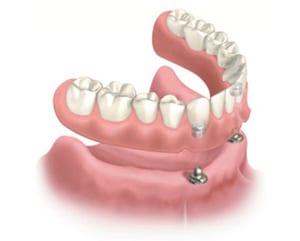When you’re missing teeth, you want to find the best replacement possible. The ideal treatment is generally dental implants. To learn more about that option, read our dental implants page.

For some, however, that is too far out of their budget, and their only option is to wear dentures. Though they are a useful treatment, if we’re completely honest, dentures have their problems.
Problems with Dentures
- They’re not stable: The upper dentures are held in by suction and fare a little better. The lower dentures rest on the ridge of the jawbone and rely on gravity and your tongue to hold them in place. Many denture wearers have experienced the embarrassment of their dentures slipping out in public.
- Sores develop: In the beginning, when your dentures are still a reasonably close fit, this is less of an issue, but as time passes, your dentures will become looser. As that begins, it is common for patients to get sores.
- Reduced chewing efficiency: With even the most well-made dentures, you lose 50% of your chewing efficiency.
- Facial Collapse: This is the biggest issue to consider. Once your teeth are removed, your body begins reabsorbing the minerals in your jawbone. There will no longer be enough jawbone to keep your dentures in place after ten or more years.
The Solution: Implant-Supported Dentures
Getting implant-supported dentures will solve each of the problems listed above. Two to six implants can be placed in your jaw, and a denture made to attach to them. Some options involve screwing the denture to the implants. This is called a fixed implant denture and requires at least four implants. Or the denture can be made to snap onto the implants. This is called an implant overdenture and can be retained with as few as two implants.
Even as few as two implants can stabilize your denture, increase your chewing efficiency, and save some of your bone structure. Of course, the more implants you have placed, the better. To make this a more affordable option, you can receive the implants in pairs, only getting the next pair when you are ready.
If you need tooth replacements, you may call our office to schedule an appointment. If you prefer, you may request an appointment online.

